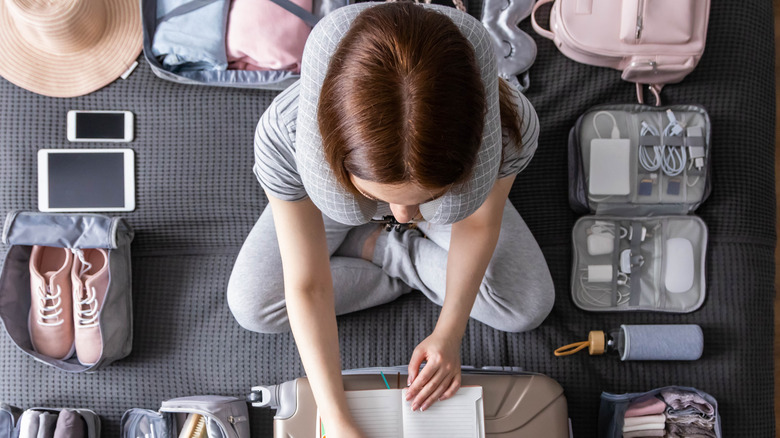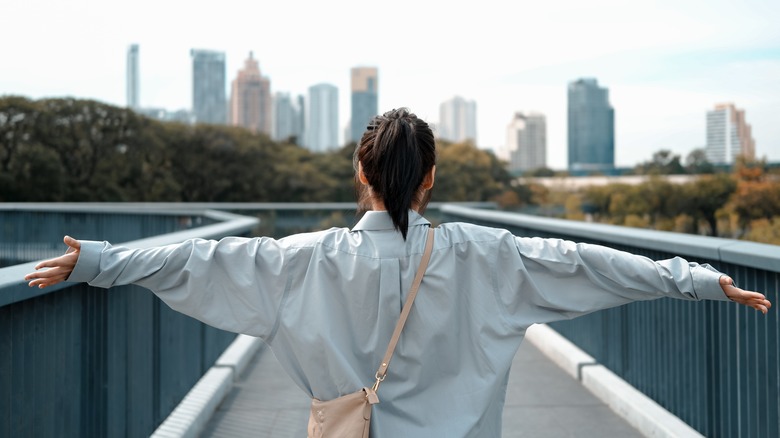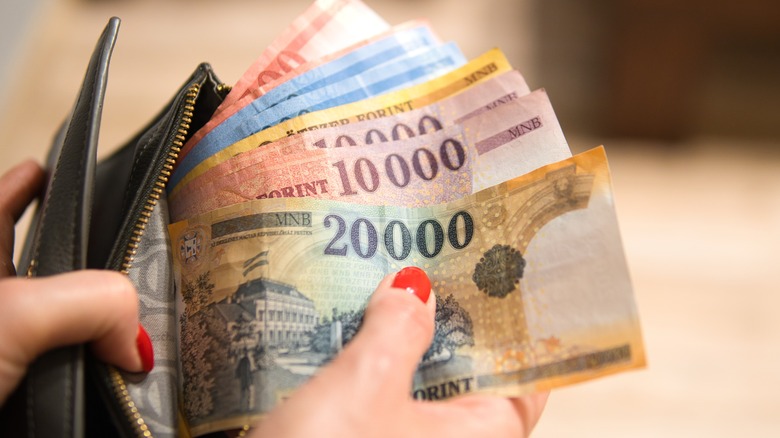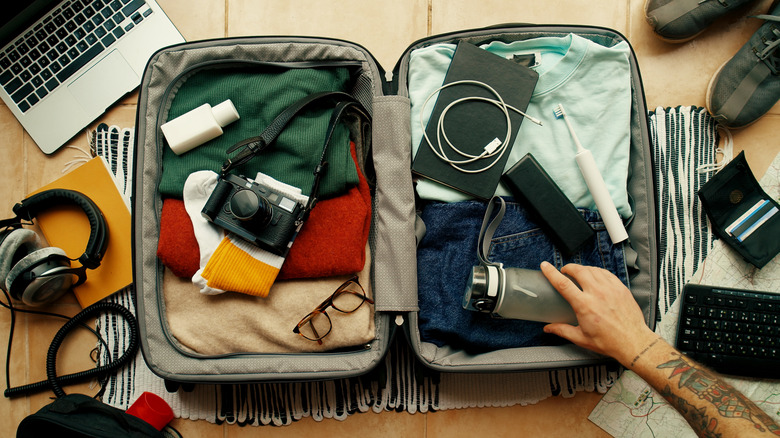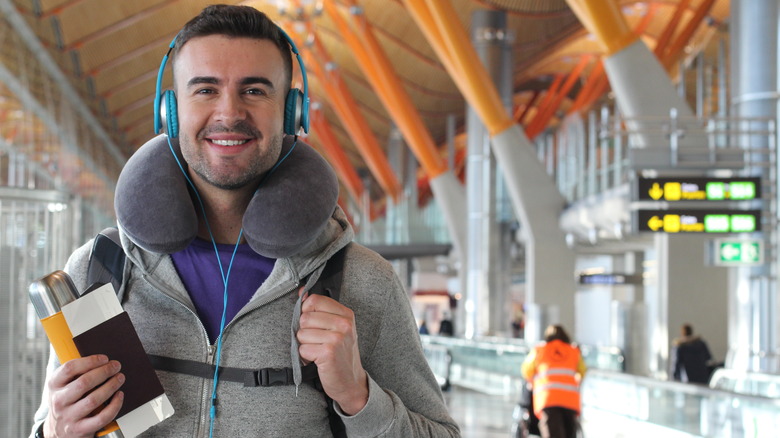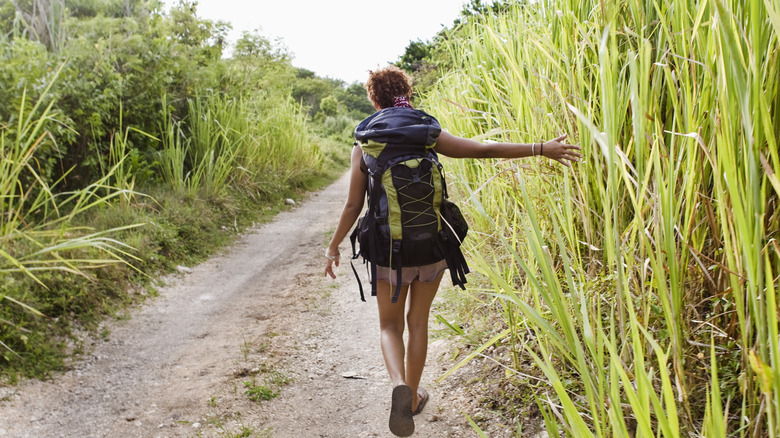6 Reasons To Keep A General Packing List
Nearly 40% of folks surveyed forget something at home when they're just going out and about so imagine how many people forget things while packing for a trip (via the New York Post). Whether you've forgotten something essential or just something aesthetic, one way to keep yourself organized and stress-free on vacation is to create a list. A little organization goes a long way. The Post further reported that 20% of survey responders said they hadn't even noticed they'd forgotten something until they opened up their suitcase!
The most forgotten item on vacation? Toothbrushes. According to Minimus, toothbrushes are the most forgotten item followed by other things like toothpaste, clothing, and toiletries. In fact, their survey found that if travelers forgot something they often forgot more than one thing though folks under the age of 35 were less likely to forget things on their trip. A lot of the stress of forgetting things can be avoided with one simple action, however: following a packing list. Whether you make one yourself or follow one you find online, here are the ways in which a list can make your vacation life so much easier.
Save time
When working with a packing list, you won't be sorting through every item in your closet and suffering from decision fatigue. Instead, you'll have a roadmap of what to look for, saving you so much time in the long run. Stephanie A. Sarkis, Ph.D. recommends going one step further than just having a packing list, but fully utilizing it. She told Psychology Today that she laminated her list and uses a dry-erase marker to go through and check off everything she needs to ensure that her pack is ready to go.
Not only does having a plan for your pack save you time before your trip, but it also saves time during your trip as well. If you have a list of clothing items to bring on your trip, you'll be spending less time figuring out outfits and more time actually enjoying your trip. Having a list is also a great way to pre-plan your outfits ahead of time rather than stressing about it later — the fewer clothing items you bring the less choice fatigue you'll endure.
Save money
If you forget things that you really need on your trip, chances are you'll have to buy replacements. Chances are also good that you'll be paying more for them — particularly if you're at a hotel where items are marked up in the gift shop. In some cases the item you've forgotten might be something you can score for free; however, that's not always the case. Especially if you forget something really important like prescription medication which might cost more wherever you go, though it's very important to get ahold of it as soon as you can. "Try your best to avoid stopping your medications abruptly," Dr. Neela Sethi Young told Yahoo on the topic of forgetting medication. "This can have serious health effects."
By following a list you can also double down on what you actually need to bring with you. For things like shampoo and conditioner, your hotel most likely has them for you so you don't need to worry as much about having space for them. The same goes for a lot of toiletry products these days because hotels tend to have a lot of them on hand, even toothpaste and mouthwash.
Save space
To make things easier on travelers, The New York Times suggests sticking to the "5, 4, 3, 2, 1" rule when packing for a week-long trip. They suggest no more than five socks and underwear, four shirts, three bottoms, two pairs of shoes, and a single hat which can obviously be adjusted depending on where you're headed. This process allows for less over-packing and sticking to just the essentials.
Creating a list can also help you leave behind what might not be necessary. But if you still find yourself wavering between a few different pieces to bring along, try sorting your stuff into categories then pare down your choices. "Fully get rid of the 'just in case I need it' category," Jon Nickel-D'Andrea of No Mas Coach! told The New York Times. "If and when you need it, you can buy it." There are also certain items that you can plan on sharing with your travel companions to save room (per Her Packing List). By planning out who is bringing what you can both save space in your luggage!
Bring what you need
By having your own version of a primary packing list, you will ensure that the things you and your family need are taken care of. Everyone's needs are different, yet the things that take precedence are largely the same. For important considerations like medications, consider laying out what you need to keep accessible in your carry-on so you can prevent unwanted emergency situations while you're away from home. As for the other things you can't pack until the day you leave? Make a separate list for those things so you don't forget anything, ADDitutde Magazine recommends.
When you're packing be sure you keep your most valuable items with you in your hand luggage, suggests Momondo. This way you don't have to worry about the airlines losing your luggage, but also you will have your most important things with you at all times. That includes medication — never pack medication in your checked bags. If you need to make a separate list of what needs to be in everyone's hand luggage, that's okay. It's better to be over-prepared to save your sanity on a well-deserved trip.
Leave what you don't need
Part of not overpacking means having a planned list but also a planned timeline in which to execute that list. Insider suggests starting your preparations about a week in advance of your adventure. Part of preparing includes checking your packing list to be sure all the clothes you want to take are clean, your bags are cleaned out of unnecessary things, and your shoes are in good working order, the outlet says.
In following your packing list, try to leave behind anything you might not need that is just going to add to your stress later. "When we're traveling, our emotions can feel more polarized since we're experiencing a stressful situation," Lara Fielding, a psychologist and author of the book "Mastering Adulthood," told Vox. "Our stress levels increase because we're not in our comfort zone, and [because we] are surrounded by uncomfortable, different people." That discomfort is largely why people tend to overpack even though much of the time it isn't necessary, the outlet adds.
By overpacking, travelers are actually limiting themselves from certain decisions. For example, it's harder to go on public transit with a large, wheeled suitcase than a backpack (via Vox). When you're planning your pack, be sure to consider how you'll be getting around or, maybe more importantly, how you want to get around.
Be ready to go
Creating or having a single, primary packing list means you're ready to go somewhere at a moment's notice. Even if you have to swap out certain things or include jackets or a swimsuit, you're generally ready to leave on a trip with very little packing prep needed. Folks who have a handle on how to pack and don't overpack give themselves more room for spontaneity not only when they're traveling but with how they're traveling (via Vox).
If you're the kind of traveler that frequently takes last-minute trips, it might benefit you to not only have a packing list but also a go-bag too. A Traveling Broad suggests creating one for yourself to make spontaneous trips less of a hassle. No, this isn't your end-of-the-world bug-out bag either, this is a more tactical way to approach spontaneous travel. The outlet suggests having a backpack loaded with your essentials like toiletries or medicine, backup electronic necessities like phone chargers, and extra ID. Having all of these things already together makes for an easy way to take a last-minute 24-to-72-hour trip without digging out that packing list again.
